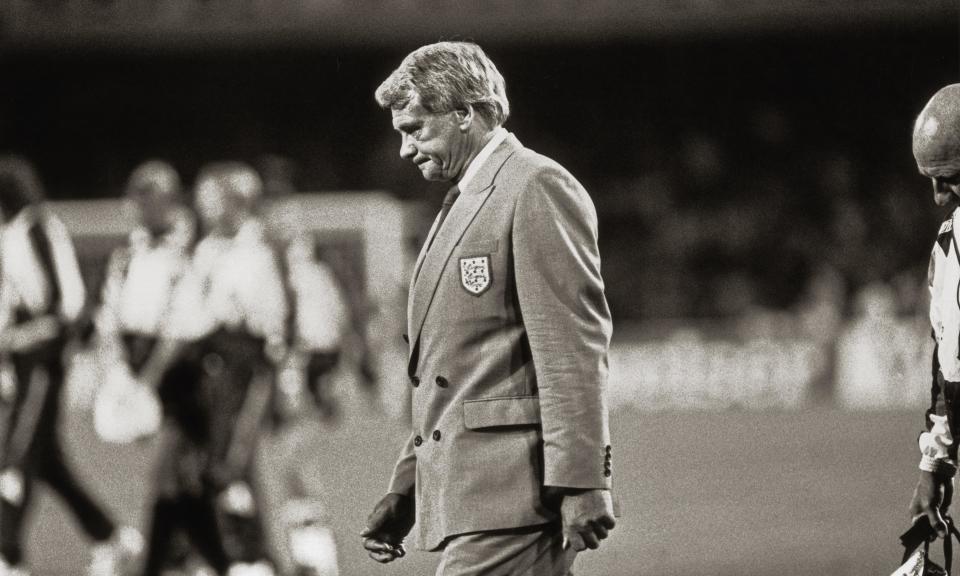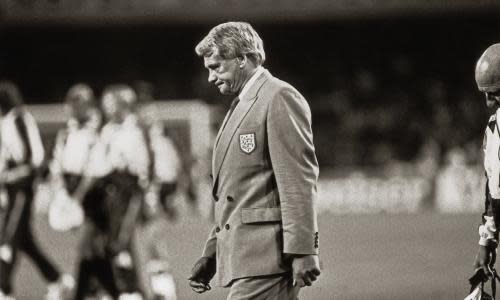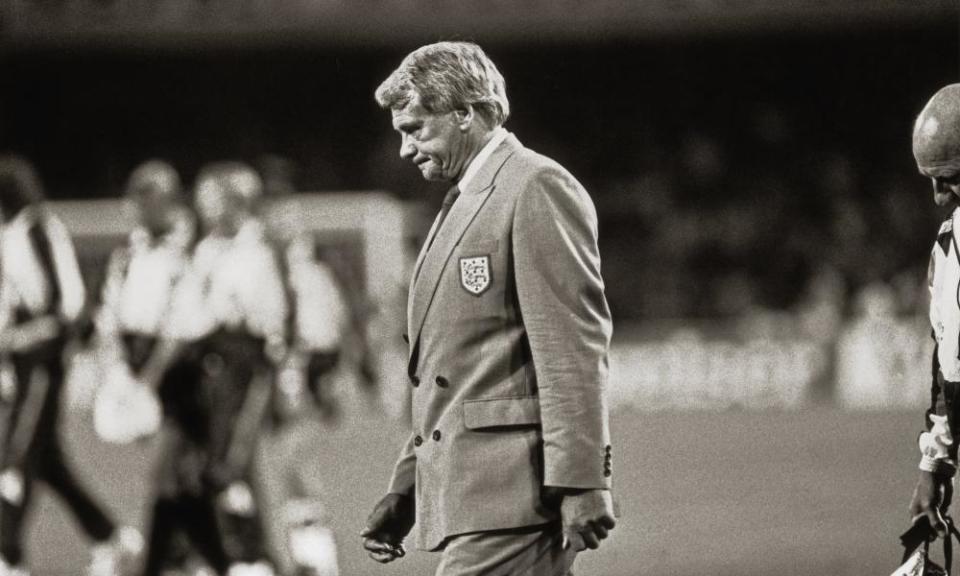Bobby Robson: the gentle master who remains a giant of English football
When Sir Bobby Robson led Gary Lineker, Chris Waddle, Paul Gascoigne and co to the semi-finals of Italia 90 he cannot have imagined it would be 28 years before another England manager repeated the feat.
Robson died nine years ago this month but his legacy extends far beyond the bronze statues standing proudly outside Portman Road and St James’ Park. Its enduring reach is not even confined to the presence of his two great protégés, José Mourinho and Pep Guardiola, in opposing Manchester dugouts but stretches to the real and continuing success of what he termed his “last and greatest team”.
READ MORE: The Three Lions lookalikes taking the World Cup by storm!
READ MORE: Who is Jamie Redknapp’s shock England star-rater so far?
READ MORE: Stones: I'll grab World Cup final chance with both hands
Established 16 months before his death, the Sir Bobby Robson Foundation has raised more than £12m for cancer treatment and research via the NHS. The charity’s pioneering impact has helped turn Newcastle-upon-Tyne’s Freeman hospital into an internationally renowned specialist cancer centre.
Fundraising for the foundation represented a big part of the reason why, a couple of Fridays ago, the magnificent Pitmen’s Parliament chamber at Redhills, otherwise the headquarters of the Durham Miners’ Association, staged a special screening of a wonderful film followed by a panel-led debate.
In his time at Middlesbrough Southgate needed Robson, in a fifth skirmish with cancer, to harden his resolve
Bobby Robson: More Than a Manager charts the life of a miner’s son who, England apart, enjoyed considerable success managing Ipswich, PSV Eindhoven, Porto, Sporting, Barcelona and Newcastle. Along the way this beautifully shot documentary – co-directed by ITV’s Gabriel Clarke – offers a very rare instance of Mourinho and Guardiola agreeing about something.
Guardiola, Robson’s captain at Barcelona, recalls “one of the nicest people I’ve met in my life” and details his disappointment after telling Robson he wanted to sign for Newcastle only to be politely turned down. Mourinho says Robson’s spirit lives on because “a person only dies when the last person that loved him dies.”
Those words were absorbed by Gareth Southgate’s players as England’s squad watched the film on the eve of this World Cup. At Redhills Mourinho’s message prompted the recounting of some entertaining anecdotes from a panel composed of three of Robson’s former players and staff – David Geddis, Olivier Bernard and Charlie Woods – in addition to his son, Andrew, and this writer.
Six clubs, one country, 12 trophies
1968 Fulham
1969-82 Ipswich Town
FA Cup 1978, Uefa Cup 1981
1982-90 England
World Cup fourth place 1990
1990-92 PSV Eindhoven
Eredivisie 1990-91 and 1991-92
1992-94 Sporting CP
Taça de Portugal 1994, Supertaça Cândido de Oliveira 1994,
Primeira Liga 1994-95 and 1995-96
1996-97 Barcelona
Supercopa de España 1996, Copa del Rey 1997,
European Cup Winners’ Cup 1997
1998-99 PSV Eindhoven
Johan Cruyff Schaal 1998 (pictured)
1999-2004 Newcastle United
Premier League third place 2002-03
An audience including Robson’s widow, Lady Elsie, as well as wider family and friends from their nearby home village of Langley Park, listened intently as a man stood up and spoke of receiving life-saving treatment after joining pioneering clinical trials funded by the foundation.
Up on the big screen Mourinho – initially employed as Robson’s translator – talked of his mentor’s extraordinary, chameleon-like ability to adapt to any surrounding and situations. The former England manager began his working life aged 15 down a mine shaft at Langley Park colliery but, as Manchester United’s manager explained: “In Barcelona he was a Catalan.”
A happy juxtaposition of humility, emotional intelligence and self-confidence offered Robson apparent immunity from culture shock but the moment in the film when a practical joke left Gascoigne with his face embedded in a plate of gooey cake serves as a reminder that he operated in a very different era.

It is easy to imagine Robson being alternately amused and intrigued by Southgate’s regimen of psychometric tests and “owning the process”; not to mention the concerted efforts of the squad psychologist, Dr Pippa Grange, at purging newly soul-baring players of emotional constipation.
Terry Butcher believes his old manager would have been receptive to this brave new world. As the former England centre-half tells the camera: “Bobby was miles ahead of his time.”
Yet for all his humanity and appreciation of life largely being “about shades of grey” Robson was no angel and could be extremely stubborn. Lineker did not exaggerate when he says: “Boy, did he have an edge.”
Southgate, albeit in a rather more understated way, also has a certain spikiness. As the Middlesbrough captain he regularly challenged Steve McClaren, his manager, and ended Wayne Rooney’s England career in subtly ruthless fashion. When the need arises, he is skilled at the polite yet searingly dismissive put-down and appreciates the media can be two-faced.
Before Italia 90 Robson learned who his real friends were when it emerged he would be moving to PSV after the tournament. Tabloid back pages branded him, among other things, a “traitor” and, in the film, Lady Elsie explains how painful the “collateral damage” was for her. Afterwards Andrew Robson touched on the bewildering upset he and his two brothers experienced.
Today’s social climate is markedly different but can still be brutally harsh and Southgate knows how quickly things can turn. After all it is only three years since, amid excitable chatter about a knighthood from some quarters, Mark Sampson led England’s women to the semi-finals of the 2015 World Cup in Canada. Some of Sampson’s innovative ideas now constitute established parts of the England men’s armoury but he has been cast into the wilderness after a well-documented sacking for non-football reasons last September.
Southgate felt management’s fragility during a tough, turbulent, relegation-scarred period as McClaren’s novice successor at Middlesbrough and needed Robson, then embroiled in a fifth skirmish with cancer, to harden his resolve. “Bobby came to Middlesbrough to talk to me and give me support,” he says. “It was very special. He was an absolute gent.”
It proved a typically classy touch from a man whose timely backing helped Southgate navigate a tricky step on his personal road to a World Cup semi-final.
Andrew Robson remembers, vividly, the tension of the last one and the hours leading up to Chris Waddle’s penalty shootout miss against West Germany. He recalls waiting anxiously, alongside his brothers, at Luton airport for a much delayed, FA-facilitated charter flight.
As the aircraft landed in Turin – happily in time for kick-off – and its doors swung open, passengers were hit by the heat of a never-to-be-forgotten Italian summer. “This Russian World Cup is amazing too,” Andrew Robson said. “I know how much my father would have enjoyed watching it – and watching England.”




